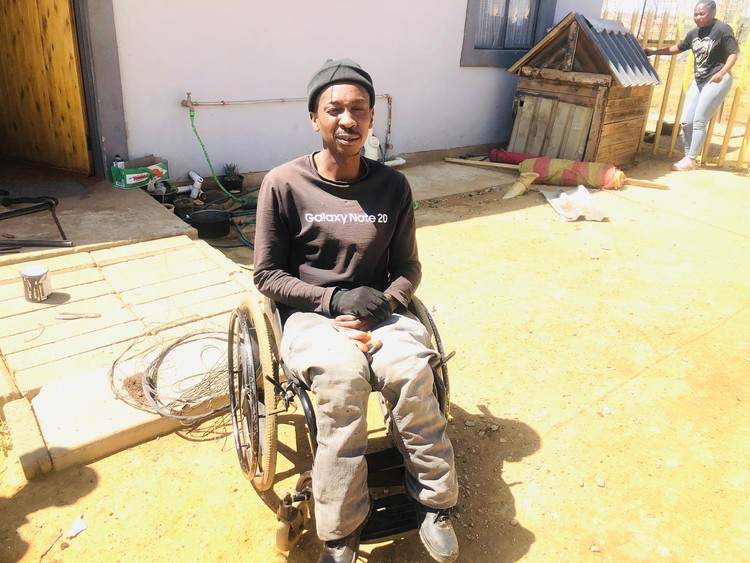
26 September 2025
Mduduzi Malaza says he was excited to finally get a home when he moved from his shack in Tsakane two years ago. But he and 14 others have been forced to live without running water and electricity for years. Photos: Kimberly Mutandiro
Beneficiaries living in a government project for elderly and people with disabilities in Extension 2, Mackenzieville say their RDP houses fall short of what was promised. At least 15 of the houses do not have electricity and consistent running water.
Wheelchair user Mduduzi Malaza said he was excited to finally get a home with services when he moved from his shack in Tsakane two years ago.
But his happiness was short-lived. He said when he first moved in, water supply was intermittent until it stopped completely. Now he relies on a water truck that comes to the community. He struggles on days when there’s no one to collect water for him in containers.
Without electricity, Malaza said he is unable to do his work as a music producer from home. He said he spends most of his disability grant on gas and he pays a shopowner to charge his cellphone every day.
Months ago he asked the municipality for solar panels but was promised that the electricity would soon be connected. “At least in Tsakane I was able to produce my music using illegal electricity,” he said.
Johanna Nsibande and husband, Dibapalo Boy Mohedo, were among the first to benefit from the special housing project. Mohedo died two months after they moved in. But five years later Nsibande still does not have electricity. She has to store water in buckets because her taps often run dry. She now relies on electricity connected illegally from a nearby home at a cost of R1,000 per month.
Johanna Nsibande’s husband, Dibapalo Boy Mohedo, was said to be about 100 years old when they moved into their house in 2019. She has not had electricity and consistent water supply ever since.
Another beneficiary Palesa Constance Kodisang does not have full function of her right arm and leg and struggles to walk.
She too has to fetch water from the truck a few meters from her home. She carries buckets of water several times from the truck to store enough water to use over a few days. However, the process is not easy due to her disability.
Kodisang, who used to live in a shack in Duduza, said she fought for years to get a house. When she was finally allocated a house two years ago, she did not expect to live without water and electricity.
The houses were built by Afrisam. (We have previously reported on how the neighbouring houses in Mackenzieville were illegally occupied in 2019.)
According to residents, the City of Ekurhuleni had committed to providing water and electricity, giving them title deeds and maintaining the houses. But years later, nothing has changed. They also accuse the contractors of shoddy workmanship as many of their homes have had structural issues like broken pipes, cracked walls and they are yet to get their title deeds.
Sherlock Louw, who lives with his wife and children, said he spends R1,000 of his R2,090 disability grant on buying gas. He also pays a friend, who lives a few roads away, to store their meat in their fridge. “Gas is very expensive. If we can have water and electricity, life would be much easier,” he said.
Sherlock Louw spends R1,000 of his R2,090 disability grant to buy gas each month because his house has not been connected to power.
City of Ekurhuleni spokesperson Zweli Dlamini denied the residents did not have water. He said the finance team has been asked to open accounts to enable the energy department to install electricity. “The process is underway.”
On the issue of maintaining the houses, he said, “The houses were built by Afrisam in a gesture that would forever be appreciated by the City as we continue with the struggle to reduce the housing backlog. The houses were handed over to beneficiaries who are now the owners of the properties and therefore must take care of them.”
He said the beneficiaries’ will get their title deeds as soon as the registration documents have been received from the provincial housing department. “Providing our people with security of tenure remains critical for this government,” Dlamini said.